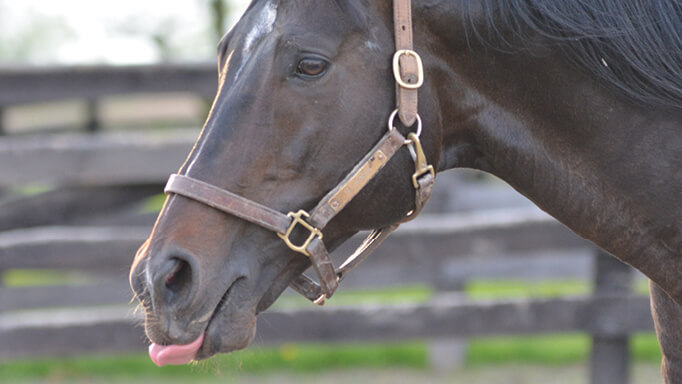Licking and chewing originates from a surge in saliva output as the body switches from the sympathetic nervous system (Whoa! We are in trouble here. Flying McDonald’s wrapper – all hooves on deck!) to the parasympathetic nervous system (Chill. Danger averted. It was the non-lethal kind.). Rather than being a submissive behaviour that says ‘I accept you as my alpha leader,’ these behaviours are nearly always indicative of a horse being released from a higher to lower state of alarm or distress.
Studying 200 feral horses living in Ecuador with almost no human intervention, Norwegian equine researchers Margrete Lie and Ruth Newberry (2018) discovered that licking and chewing was observed in all horses. In threatening encounters, both the aggressor and the submissive horse licked and chewed, although, surprisingly, aggressors did so slightly more often. These results suggest that licking and chewing does not appear to be a submissive gesture.
This misconception starts further back with what I have come to refer to as the “dominance nonsense.” Much (though not all) of the horse-whispering narrative focuses around the notion that since a dominance hierarchy is so critical to all equine social organization, we must speak the language of Equus and establish ourselves as top dog – or in this case, top horse. There are a number of fallacies associated with this approach that may be at best unfair, at worst inhumane, and nearly always counterproductive to training.
Horse Herd Hierarchy?
Research on equine herd hierarchy has tried to establish a rank order by observing aggressive encounters between group members. The task has proved difficult, because very little aggression occurs. Horses show little motivation to “dominate” one another, because conflict is costly and best avoided if possible. The International Society of Equitation Science (ISES) position statement on dominance states that there is little evidence suggesting an overall rank in equine social organization. Rather, horses tend to form bilateral relationships where a new contract is negotiated separately for each herd member and which varies across different situations.
Horse Trainer as Alpha?
Even if it could be established that herd hierarchies are as solid and unvarying as has been claimed, there is no evidence to suggest that horses consider us as one of their social circle and hence deserving of a rank order. Dominance training is simply poor training, as it makes assumptions about horses’ interest in pleasing us, gives trainers license to punish them when they do not, and ignores basic training principles of learning science. Horses do not comply because they feel confident in our leadership; they do so as a result of reinforcement – because their human trainers have consistently rewarded that response in the past.
For example, a horse that will not load onto a trailer is not refusing to load because he does not have confidence in his handler’s leadership, but because his training to lead forward has been insufficiently generalized to lead forward into unwelcoming places. When training (not beating) reverses this situation, leading signals override the aversiveness of the trailer.
The alpha leader concept is also misleading in that it implies that once you have earned the horse’s respect, he will happily leave the sanctuary of friends and follow you anywhere – even to unpleasant places. Yet there is no scientific documentation of this phenomenon ever occurring based solely on the leadership skills of the trainer.
Why does it matter?
Dominance nonsense threatens horses’ well-being when trainers believe that horses’ undesired behaviours stem from a defiance to their authority and status. The more plausible and parsimonious explanation – that the horse does not understand the question, that there is no clear correct response, or that the horse is psychologically or physically unable to comply – is often overlooked. The dominance training model has very little to do with equine social organization and may ultimately not foster the harmonious relationship with horses to which it aspires.

